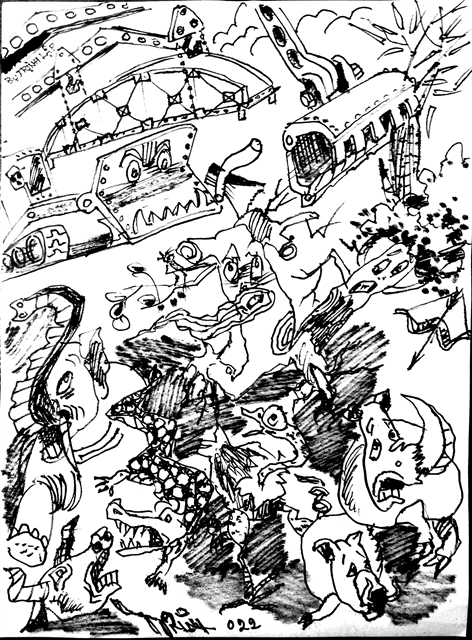 Talk Around Town
Talk Around Town


|
| Illustration by Trịnh Lập |
by Nguyễn Mỹ Hà
Local residents and environmentalists have been spreading the news that UNESCO Việt Nam has opposed an official letter from the Đồng Nai People's Committee consulting on a contractor's proposal to build a 40km highway with a bridge across the core zone of the Đồng Nai Biosphere Reserve.
VnExpress news website reported that UNESCO Việt Nam, in response to the letter, strongly suggested not building a road across the world biosphere for fear the damage would impact flora and fauna in reserve. It added that the full biodiverse ecological corridor would be affected.
Vehicles moving on the road could accidentally kill animals crossing it, and the construction process would pollute the soil, air and groundwater.
If this happens, the criteria for a world biosphere would not be met, and Đồng Nai Reserve could be crossed off the list of world biospheres.
It also cited that building a bridge and a national highway failed to meet Việt Nam's forest protection and bio-diversity criteria as per the country's laws.
Đồng Nai is the new name of the more familiar Cát Tiên Biosphere Reserve, which was designated in 2011.
Located in Đồng Nai Province, in eastern Nam Bộ (south Việt Nam proper), this region embraces the southern end of the Trường Sơn mountain range down to lowland rivers, streams, semi-plains, hills, relatively flat lands and scattered lakes and wetlands in the southeast region.
Đồng Nai is one of 11 biospheres recognised by UNESCO, with others in the list including Cát Bà Island, the Red River Delta in the north, Western Nghệ An in the centre, Langbiang in the Central Highlands and Cần Giờ in the south.
This is in response to the direction of the Prime Minister's Office to carefully consider Bình Phước Province's proposal to build a road across the Mã Đà River to connect Bình Phước to Long Thành Airport (under construction) and deep seaport Cái Mép Thị Vải.
However, Bình Phước, a landlocked province, needs to access transportation centres, the airport and the seaport.
Đồng Nai wants to protect the biosphere and would not approve of building a highway and bridge cutting into the protected zone. Đồng Nai authorities have appealed to reconsider the master plan and look at replacement options.
Đồng Nai's transportation authority agreed with the general upgrading of National Highway 13C to improve infrastructure, connecting the eastern Nam Bộ provinces to the national transportation network, seeing it as a valid plan.
But it disagrees with building roads in the biosphere and has proposed a better alternative, which the Đồng Nai People's Committee has not approved.
Đồng Nai already has a project to build a road surrounding Trị An Reservoir. When it's done, the current road ĐT761, currently running through the forest, shall be closed and handed over to the authority of the biosphere.
The Đồng Nai authority has four options to upgrade National Highway 13C, building Mã Đà Bridge before submitting the project to the Prime Minister's Office. The Ministry of Transport has studied the Mã Đà Bridge and its environmental impact before sending it off to the Prime Minister for decision.
In its letter to UNESCO Việt Nam, the Đồng Nai authority voiced its deep concern over any new road's environmental impact on the biosphere's natural habitat and forest protection.
Before that, Man and Biosphere Việt Nam (MAB Vietnam) proposed that Đồng Nai's People's Committee do not build Mã Đà Bridge.
The proposed road would destroy not only the landscape, but also cut open the core zone of the biosphere, affecting the flora and fauna of the immediate surrounding area, and affecting the protection of three national historical heritages.
This is not the first time the authorities of Đồng Nai showed their concern about the impact on the biosphere. Nearly 10 years ago, Bình Phước could not get the project started because the Đồng Nai authorities did not approve the project. Đồng Nai then blocked the road and forbade any ferries from crossing the river for fear of impacting the biosphere.
Đồng Nai has the largest forest area in eastern Nam Bộ, with 169,000ha including special forests, forests for protection and man-grown forest. It was the first province in the country to close its forest for exploitation, back in 1996.
The public has voiced a positive opinion on Đồng Nai's approach, which is an optional replacement of the shortest section of road possible. It would still save 30km in travel and would lead to less fuel and smoke being dispersed into the environment.
Economic growth gives jobs and incomes to a group of the population, but an intact biosphere provides oxygen and natural ecology for a better environment for all to exist.
Again, the balance between development and environment comes down to this decision. We should not give up our ecology for temporary economic gains. We must keep the environment intact for generations to come. After all, it is our home. VNS




